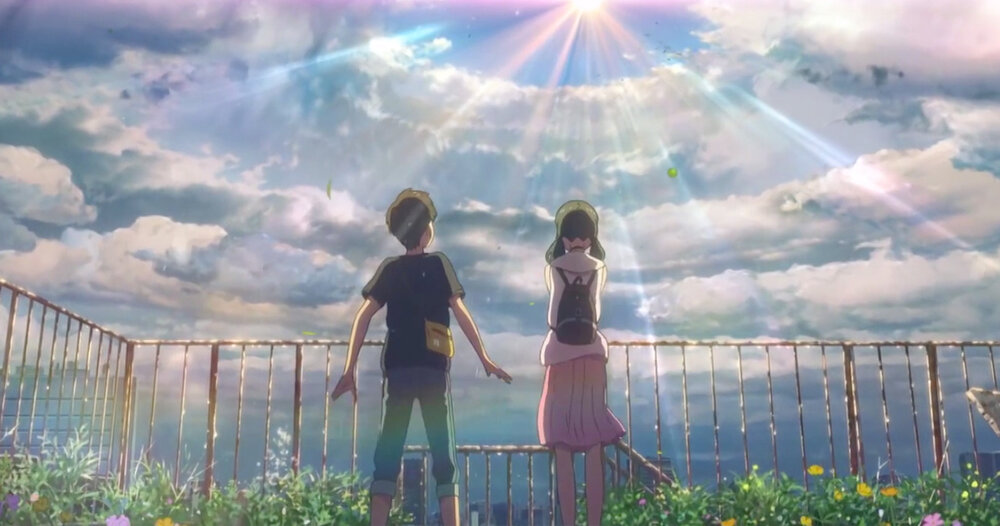TIFF19: Weathering with You
Makoto Shinkai’s Weathering with You smashes together teenage romantic melodrama and high-concept fantasy in a way that only anime can manage. Like Shinkai’s previous film, the blockbuster Your Name, the film is so gorgeously animated as to make it worthwhile viewing for anyone who appreciates beauty. But also like Your Name, although to a more subdued degree, the film is a strong argument for empathy and the need to look beyond your own understanding of the world. It’s a coming of age romance that satisfies because of the depth of its characters and its obvious compassion for those very characters.
At the film’s centre is Hodaka (Kotaro Daigo), a 16-year-old runaway who makes it to Tokyo and falls for Hina (Nana Mori), a teenage orphan and fellow outcast living on the edges of society. However, Hina is not just another outcast, but also a “sunshine girl,” which means she has the power to pause the record-breaking rains drowning Tokyo and make the sun come out for short periods of time. Hodaka and Hina make a business of renting out Hina’s powers to bring out the sun, but the consequences of using her powers go far beyond the comprehension of these two lonely teenagers.
Like Your Name, Weathering with You operates on a high-concept that taps into mythic storytelling, but brings it into a contemporary context, where things like skyrocketing rents, the ubiquity of prostitution, online forums, and other aspects of modern Tokyo come into play. It’s a film of broad and earnest emotions, without much irony or cynicism about human relationships, even if it acknowledges the harsh realities that undergird so many lives. The film is too interested in the characters to judge them harshly, focusing on Hodaka’s inability to express himself, Hina’s self-loathing linked to the death of her mother, and the strengths and foibles of supporting characters including Hodaka’s father-figure boss, Suga (Shun Oguri), and Hina’s Don Juan-esque little brother, Nagi (Sakura Kiryu).
Shinkai’s interest in the characters and attention to detail pays off throughout, especially in the emotional climax that conjures considerable romantic power. Especially interesting is Hodaka’s coming-of-age journey, which develops as he starts to look beyond himself and comprehend the inner lives of others. To accomplish this progression, Shinkai aligns our perspective with Hodaka’s own limited one. Thus, when he meets Hina and Suga, we accept his assumptions about them as true, only to have them challenged midway through the film when new information upends his blinkered characterizations. This not only broadens Hodaka’s understanding as a character, but it affects us as viewers, since it implicates our own easy assumptions as well as his own. We learn as he learns; we grow up as he does. Again, the exercise in empathy is not dissimilar to the one in Your Name, although less connected to the film’s high-concept.
Speaking of the high-concept, the film’s fascination with the weather and climate catastrophe is less successful than the strong character work. There’s an obvious metaphor at play linking Hina’s powers in the film and climate change in the real world. The film hints at the need for individuals to take responsibility for changing the world’s climate, but the resolution of the plot confounds what I thought was a clear-cut metaphor. In short, I’m not sure the film’s thesis on climate change makes much sense by film’s end, even if individual moments dealing with a drowning Tokyo are compelling in their imagery and frightening implications.
That the film’s muddled metaphor regarding its high concept doesn’t sink the film speaks to how successful it is as a teenage romance and melodrama. Weathering with You doesn’t have the same stunning narrative twists as Your Name, but there are compelling revelations throughout, especially with regards to character. It’s another strong coming-of-age film with gorgeous animation and a humane understanding of people trying to make the best of their lives.
7 out of 10
Weathering with You (2019, Japan)
Written and directed by Makoto Shinkai; starring Kotaro Daigu, Nana Mori, Shun Oguri, Tsubasa Honda, Chieko Baisho, Sakura Kiryu.
